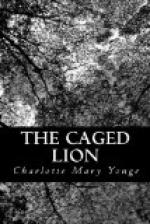‘Oh, I entreat you, tell us, dear lady!’ entreated Alice. It was not a reticent age. Malcolm Stewart had already avowed himself in his own estimation pledged to a monastic life, and Esclairmonde of Luxemburg had reasons for wishing her position and intentions to be distinctly understood by all with whom she came in contact; moreover, there was a certain congeniality in both her companions, their innocence and simplicity, that drew out confidence, and impelled her to defend her lady.
‘My poor Countess,’ she said, ’she has been sorely used, and has suffered much. It is a piteous thing when our little imperial fiefs go to the spindle side!’
‘What are her lands?’ asked Malcolm.
‘Hainault, Holland, and Zealand,’ replied the lady. ’Her father was Count of Hainault, her mother the sister of the last Duke of Burgundy—him that was slain on the bridge of Montereau. She was married as a mere babe to the Duke of Touraine, who was for a brief time Dauphin, but he died ere she was sixteen, and her father died at the same time. Some say they both were poisoned. The saints forfend it should be true; but thus it was my poor Countess was left desolate, and her uncle, the Bishop of Liege—Jean Sans Pitie, as they call him—claimed her inheritance. You should have seen how undaunted she was!’
‘Were you with her then?’ asked Alice Montagu.
’Yes. I had been taken from our convent at Dijon, when my dear brothers, to whom Heaven be merciful! died at Azincourt. My oncles a la mode de Bretagne—how call you it in English?’
‘Welsh uncles,’ said Alice.
’They are the Count de St. Pol and the Bishop of Therouenne. They came to Dijon. In another month I should have been seventeen, and been admitted as a novice; but, alack! there were all the lands that came through my grandmother, in Holland and in Flanders, all falling to me, and Monseigneur of Therouenne, like almost all secular clergy, cannot endure the religious orders, and would not hear of my becoming a Sister. They took me away, and the Bishop declared my dedication null, and they would have bestowed me in marriage at once, I believe, if Heaven had not aided me, and they could not agree on the person. And then my dear Countess promised me that she would never let me be given without my free will.’
‘Then,’ said Alice, ‘the Bishop did cancel your dedication?’
‘Yes,’ said Esclairmonde; ’but none can cancel the dedication of my heart. So said the holy man at Zwoll.’
‘How, lady?’ anxiously inquired Malcolm; ’has not a bishop power to bind and unloose?’
‘Yea,’ said Esclairmonde, ’such power that if my childish promise had been made without purpose or conscience thereof, or indeed if my will were not with it, it would bind me no more, there were no sin in wedlock for me, no broken vow. But my own conscience of my vow, and my sense that I belong to my Heavenly Spouse, proved, he said, that it was not my duty to give myself to another, and that whereas none have a parent’s right over me, if I have indeed chosen the better part, He to whom I have promised myself will not let it be taken from me, though I might have to bear much for His sake. And when I said in presumption that such would lie light on me, he bade me speak less and pray more, for I knew not the cost.’




